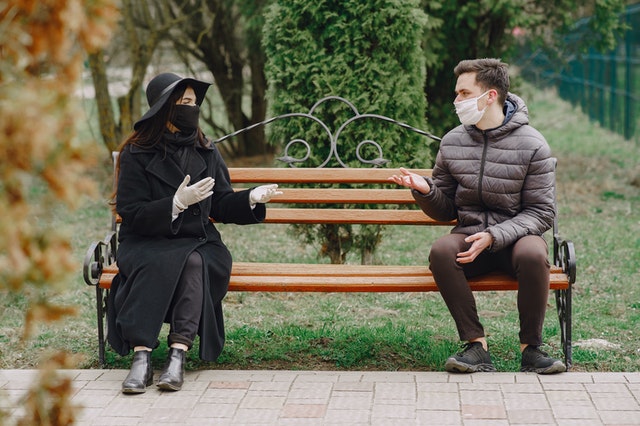Connection.
In all of its forms, it can be healing, transformative, and is one of our most basic emotional needs.
It can also be harmful and hateful.
Who knew that one of the last friend hugs I would ever receive in the last 15 months was from a close pal when I was travelling back home from a conference.
I am known for my hugs. When I hug, I express the emotion I truly feel for another individual. It is my way of leaving my energy and connection on another person. Of letting them know I am truly there and I love them.
Since I have not been able to hug freely, my whole dynamic toward others has slightly changed.
It was March of 2020 when my world dramatically shifted and my province’s government was making impactful statements regarding this pandemic and its dangers. Rules were being created minute by minute; that Friday the 13th was chaos for everyone I was near as I travelled that day. I came home to more reactions, and trying to support our children, who had suddenly lost their own connections in many areas of their lives, was a moment I will never forget.
In those early days, our trust in one another was being sabotaged and broken in ways that we felt couldn’t be mended.
We were then, and to a high degree still are, isolated with conditions put upon us that we had to be considerate of for fear of harming someone we did not even know. At times, we have virtually been left with only virtual and verbal ways of connection in an ever-changing digital world.
With these changes put upon us, I have seen connection being used to harm others instead of to help. Some feel their voice has been taken away and others feel they can step up with harmful words and actions.
If we could better accept change instead of just being tolerant of it, we may be able to have a better sense of connection with the knowledge being shared about this new disease and more trust in the person beside us. We may be able to develop a bigger sense of compassion and learn how we can work together to embrace this change and see a different way forward.
The fearmongering happening with the daily counts and media stories sharing only the tragedies has brainwashed a good deal of us. We are drawn to the pain, the terror, and the hopelessness.
We have become desensitized in so many ways already with the various and important movements and the violence that seems to have been put upon one another, either as a part of the story within that movement or someone’s strong feelings that don’t agree with their counterpart.
People whose senseless deaths have captivated the cruelty we are capable of. The lack of justice for those who have been lost that we are not able to gain closure on and the hopelessness that follows.
As a former broadcaster, I used to be full of pride in how two sides of a story were needed to provide at least most of the picture. Privacy acts have changed that. With the onset of the internet, a new kind of media formed that competed with anything that existed elsewhere.
Headlines are created first for clickbait, and next, to inform. Media’s ethical responsibility has turned into a feeding frenzy for our emotions. Staying truthful and courageous seems to be the harder path now. Knowing legitimate sources of information because of a lack of regulation in the online world makes finding the truth like a treasure hunt in the Amazon.
2020 was such a tumultuous year, it should have its own textbook. The societal, cultural, and creative turns that have been taken are disrupting and emotionally draining.
Not only are we six degrees apart, but six feet too.
Sharing air can potentially kill us. The freedom to breathe and freedom of speech are at stake. There will be an entire generation of young children who will grow seeking disconnection and distrust and will be looking for antibacterial pumps at every turn and thinking of matching their masks with their outfits. We need to be prepared for that.
Those who have struggled with all of this change are screaming the loudest and wanting to inflict pain on those who are just trying to go with the flow. The most quiet have now become permanently silenced for fear of being attacked.
Our struggle to connect on any level at all feels more impossible when it is being used to harm. The hate being bred by the lack of compassion for others and the lack of assertiveness due to COVID-19 fatigue can make life seem unbearable.
Our ability to change or not to change has been observed for over 2,000 years in philosophy. Greek philosopher, Heraclitus of Ephesus (I. c. 500 BCE) said, “The only constant in life is change.”
Martin Luther King Jr. shared his view, “Change does not roll in on the wheels of inevitability, but comes through continuous struggle.”
For me, in our current worldly climate, Charles Darwin stated it best, as a test for the human race. “It is not the strongest species that survive, nor the most intelligent, but the most responsive to change.”
How do we move forward with the changes we are facing?
I offer words from the beautiful Mother Theresa, “If we have no peace, it is because we have forgotten each other.”
I am you, you are me—we are one. To develop an immunity against COVID-19, the opportunities and miracles are being explored, created, and injected as we speak.
However, we do not want to develop an immunity against community. We do not want to become numb to the needs of another human being. To reaching out through text or phone, to waiting our turn or complimenting a stranger. To lending a hand or leaning on that door to open it for another.
We want to come together, not fall apart. We want to stand up for the wronged and be an oak, rooted in our truth.
We need to adapt and transform to evolve. We need to pick our battles and lay down our swords and think beyond ourselves and respect the greater good being asked of us.
The connection we still have lies deep within each of us and we can nurture it in these times through the creative ways we still have to reach and share and love: texting, calling, and Zooming.
I reach out to you with these words and send you peace and moments of blessings from my corner of Canada. From 1 Corinthians 13:13: “And now these three remain: faith, hope, and love. But the greatest of these is love.”
~











Read 6 comments and reply